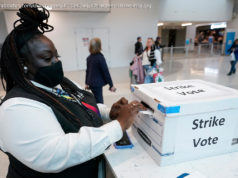The Supreme Court heard oral argument in the challenge to President Trump’s Muslim Travel Ban. It didn’t appear to go well for the challengers.
On the final argument day of the current term, the Supreme Court heard oral argument today in the case challenging President Trump’s travel ban that is primarily directed at nations that are predominantly Muslim, and the consensus appears to be that it was not a good day for the parties challenging the order:
WASHINGTON — The Supreme Court’s five-member conservative majority appeared prepared on Wednesday to sustain President Trump’s authority to impose a travel ban restricting entry into the United States from several predominantly Muslim countries.
Those justices seemed ready to defer to Mr. Trump’s presidential national-security judgments and to discount his campaign promises to impose a “Muslim ban.”
Immigrant rights groups had hoped that Chief Justice John G. Roberts Jr. or Justice Anthony M. Kennedy would join the court’s four-member liberal wing to oppose the ban. But their questioning was almost uniformly hostile to the challengers.
Just a week after he took office, Mr. Trump issued his first travel ban, causing chaos at the nation’s airports and starting a cascade of lawsuits and appeals. Fifteen months later, after two revisions of the ban and a sustained losing streak in the lower courts, the Supreme Court took up the case in its last scheduled argument of the term.
Although the court had considered aspects of an earlier version of the travel ban, this was the first time the justices heard arguments on any of the challenges. A decision is expected by late June.
The case, Trump v. Hawaii, No. 17-965, concerns Mr. Trump’s third and most considered bid to make good on his campaign promise to secure the nation’s borders. Challengers to the latest ban, issued as a presidential proclamation in September, said Mr. Trump’s campaign speeches and tweets about Muslims were a clear indication that the ban was aimed at a particular religious group and not justified by security concerns.
The administration said the third order was the product of careful study by several agencies into the security and information-sharing practices of nations around the world. The president’s lawyers urged the courts to ignore Mr. Trump’s statements and Twitter posts, and to focus solely on the text of the proclamation and the process that produced it.
Several justices asked Solicitor General Noel J. Francisco about the government’s national security justifications for the travel ban, pressing him to explain why the restrictions should not be seen as tainted by religious animus.
Justice Elena Kagan offered a hypothetical situation in which a future president who is “a vehement anti-Semite and says all kinds of denigrating comments about Jews” comes into office and bans entry to the United States from Israel.
“The question is, what are reasonable observers to think given this context?” Justice Kagan asked, adding that she was asking about an “out-of-the-box kind of president.”
Mr. Francisco acknowledged that “this is a very tough hypothetical.” But he said such a proclamation could be lawful.
“If his cabinet were to actually come to him and say, ‘Mr. President, there is honestly a national security risk here and you have to act,’ I think then that the president would be allowed to follow that advice even if in his private heart of hearts he also harbored animus,” Mr. Francisco said.
Mr. Francisco rejected the suggestion that the proclamation was meant to ban Muslims from entering the United States.
“This is not a so-called Muslim ban,” he said. “If it were, it would be the most ineffective Muslim ban that one could possibly imagine.” It excluded, he said, “the vast majority of the Muslim world.”
Justice Samuel A. Alito Jr. added his own statistics.
“I think there are 50 predominantly Muslim countries in the world,” he said. “Five predominantly Muslim countries are on this list. The population of the predominantly Muslim countries on this list make up about 8 percent of the world’s Muslim population. If you looked at the 10 countries with the most Muslims, exactly one, Iran, would be on that list of the top 10.”
Neal K. Katyal, a lawyer for the challengers, rejected that analysis. “If I’m an employer and I have 10 African-Americans working for me and I only fire two of them” but retain the other eight, he said, “I don’t think anyone can say that’s not discrimination.”
Justice Kennedy pressed Mr. Katyal about whether judges should second-guess a president’s national security judgments. “That’s for the courts to do, not the president?” he asked, skeptically.
Mr. Katyal responded that presidents ordinarily deserve substantial deference. But he said the travel ban was so extreme that the Supreme Court should step in.
Justice Kennedy noted that the latest travel ban was longer and more detailed than proclamations issued by earlier presidents. He also appeared to speak approvingly of a part of the proclamation that called for periodic reports.
(…)
Chief Justice Roberts asked whether Mr. Trump will forever be unable to address immigration in light of his campaign statements.
“Is there a statute of limitations on that?” the chief justice asked.
Mr. Katyal said Mr. Trump and his advisers could have repudiated his earlier statements. “Instead they embraced them,” Mr. Katyal said.
The chief justice then asked whether Mr. Trump could immunize his order from constitutional challenge simply by disclaiming his earlier statements. “If tomorrow he issues a proclamation saying he’s disavowing all those statements,” the chief justice asked, “then the next day he can re-enter this proclamation?”
Mr. Katyal said yes.
SCOTUSBlog’s Amy Howe comments:
Arguing on behalf of the Trump administration, U. S. solicitor general Noel Francisco emphasized that the September 2017 order was the result of a lengthy “world-wide multi-agency review,” which prompted the Department of Homeland Security to recommend that the president restrict travel to the United States by travelers from countries that had failed to meet minimum standards for providing information that can be used to vet those travelers.
Justice Ruth Bader Ginsburg interrupted Francisco, suggesting that federal immigration laws only allow the president to “suspend” the entry of travelers into the United States as a temporary remedy, to give Congress time to pass laws to address any problems.
Justice Sonia Sotomayor saw a different problem. In her view, Congress had already addressed the same problem that, according to Francisco, led the president to issue the order. Congress enacted a visa-waiver program, which allows the citizens of some countries to travel to the United States for up to 90 days without having to obtain a visa, it established a more stringent vetting procedure for citizens of other countries that do not meet the requirements for the waiver program and it added yet another layer of review for terrorist countries. Here, Sotomayor complained, the president wants to go beyond the limits that Congress has already set. Where does he get the authority to do that? she asked.
Francisco also had to grapple with concerns about statements made by the president, both on the campaign trail and after he took office, about banning Muslims from the United States, and whether those statements suggested that the president intended to discriminate against Muslims. Francisco insisted that the September 2017 order is “not a so-called Muslim ban”; if it were, he added, it would be the “most ineffective Muslim ban ever,” because it fails to target most Muslim countries.
But Justice Elena Kagan posed a hypothetical, asking Francisco to consider a scenario with an “out of the box president” (a characterization that drew laughs from the audience) who was a “vehement anti-Semite” before taking office. If during his presidency, he asked his cabinet to issue recommendations for a proclamation that would ban all travelers from Israel, would that violate the Constitution’s establishment clause, which bars the government from discriminating based on religion?
Francisco insisted that it would not, because the president could follow the cabinet’s advice if it cited a national security risk from Israeli travelers, no matter what might have been in his “heart of hearts.”
It wasn’t clear whether Kagan was convinced, but other justices – most notably Chief Justice John Roberts and Justice Samuel Alito – were clearly worried that a ruling for the challengers might entangle courts in second-guessing the president’s national-security determinations. Roberts led the way, asking attorney Neal Katyal, who represented the challengers, to imagine a scenario in which U. S. intelligence agencies tell the president that 20 Syrian nationals are planning to come to the United States with chemical weapons. Could the president ban all Syrians from coming to the United States, Roberts asked?
Katyal responded that such a ban would pass muster. He reasoned that it wouldn’t be discrimination based on nationality, which immigration laws prohibit, but instead would be an effort to address a fast-moving emergency. But in this case, he contrasted, the president’s first order restricting entry into the United States was issued 460 days ago, and the president has never asked Congress to act.
Alito later asked a similar question. Is there any situation, he queried, in which the threat of terrorism could be so severe that the scheme that Congress enacted would be inadequate to deal with the problem? Katyal agreed that there could be, but that response got him into hot water with Justice Anthony Kennedy. So the courts need to determine whether there is an emergency? Kennedy asked.
Kagan echoed Kennedy’s concern, observing to Katyal that the September 2017 order points to the important national-security issues at stake. How is the Supreme Court supposed to determine the legality of the president’s order, she asked, without evaluating whether those national-security interests are real?
More broadly, Alito seemed skeptical that, especially when the president’s tweets and statements about a Muslim ban are put aside, the president’s September 2017 order actually is a “Muslim ban.
Home
United States
USA — mix Supreme Court Appears Skeptical Of Challenge To Trump's Muslim Travel Ban






